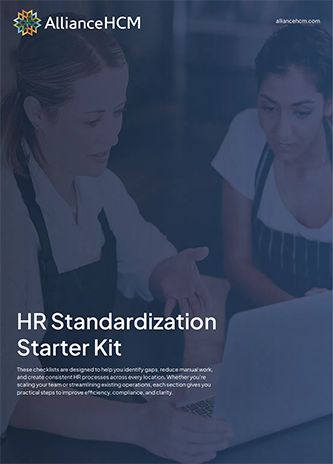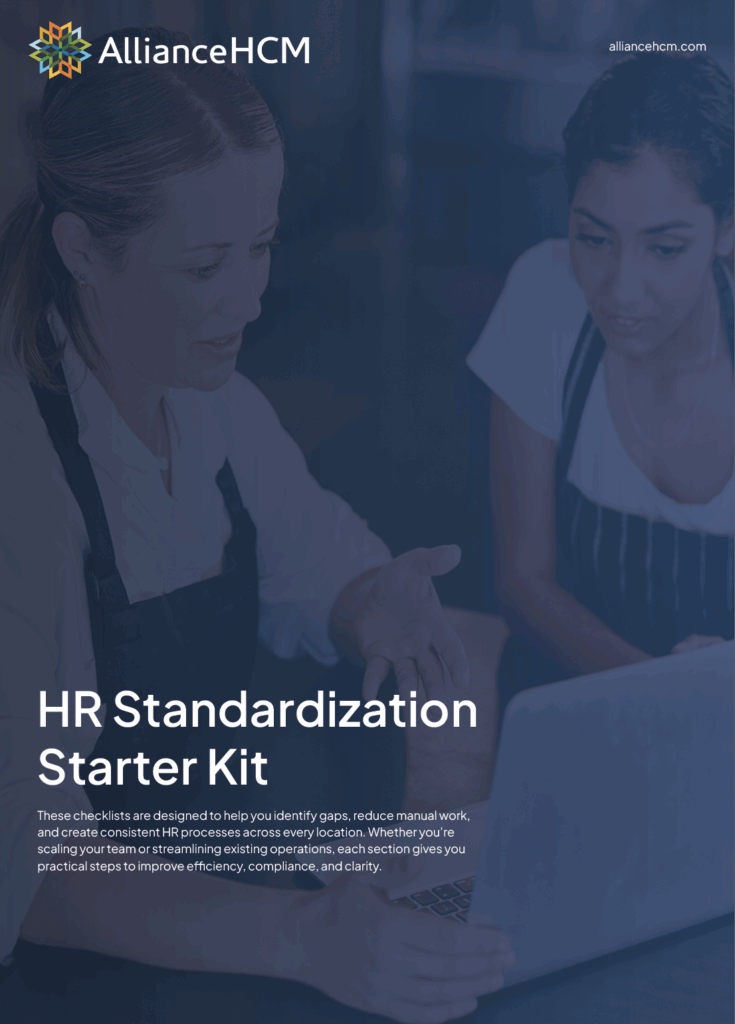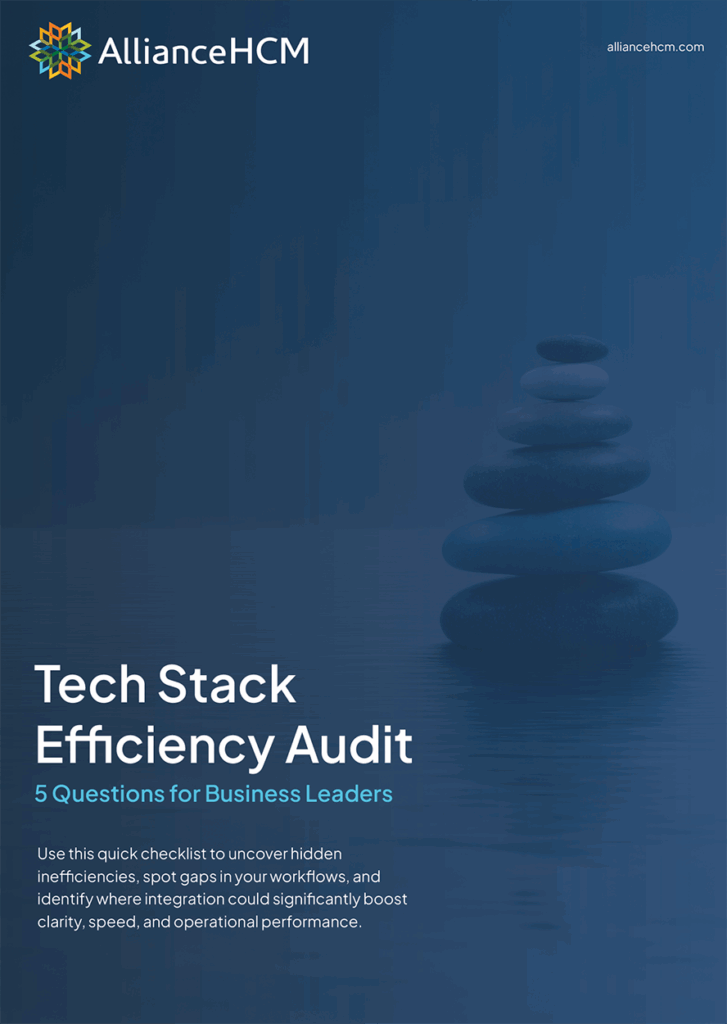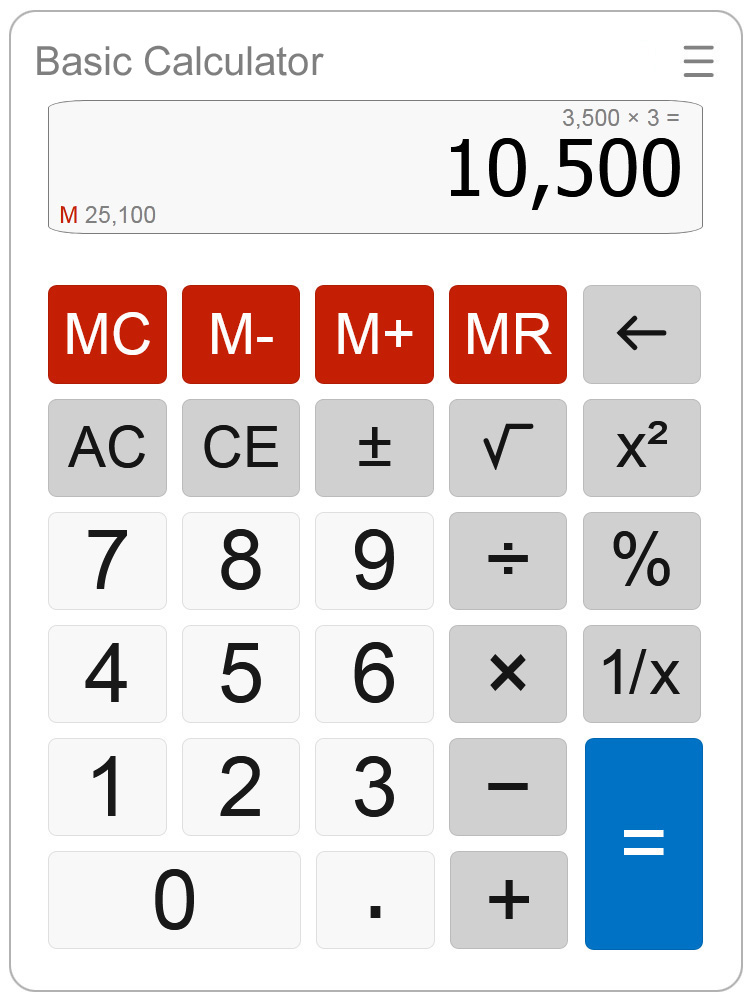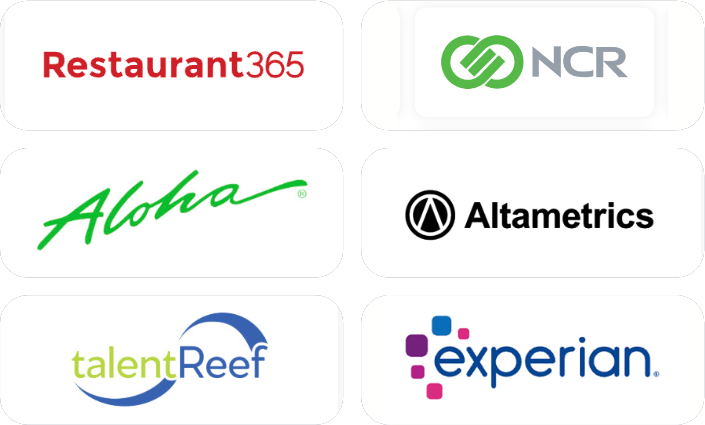Artificial intelligence is transforming HR operations by automating tasks, accelerating hiring, and enhancing employee engagement—but its adoption also brings ethical and practical challenges. In this blog, we explore how AI can streamline processes like recruiting and payroll while highlighting the importance of maintaining fairness, transparency, and human oversight. From predictive analytics to AI chatbots, the benefits are clear—but so are the risks of bias and privacy concerns if misused. At AllianceHCM, we advocate for AI that empowers people, not replaces them—helping HR teams lead with both innovation and integrity.
Key Takeaways
- AI improves efficiency in HR functions such as recruiting, workforce planning, and employee support.
- Recruiting processes benefit from faster resume screening and candidate matching, but require human oversight to prevent bias.
- Predictive analytics support smarter staffing decisions by forecasting turnover and performance trends.
- Ethical concerns include algorithmic bias, privacy, and over-reliance on automation, all of which must be carefully managed.
- Trust and transparency are essential—HR leaders must clearly communicate how AI is used and safeguard employee data.
- Human judgment remains vital; AI should assist HR professionals, not replace their expertise and empathy.
Recruiting
One of the most visible impacts of AI in HR is in recruiting. With intelligent software capable of scanning thousands of resumes in seconds, companies can now identify qualified candidates faster than ever. Some systems even conduct initial screenings, analyze behavioral cues, and recommend top applicants based on historical hiring data. This reduces time-to-hire and helps HR teams focus on deeper, more strategic aspects of recruitment. AI can also help reduce human error in filtering applications, but if not carefully monitored, it may replicate bias present in the data it learns from. That’s why companies must treat AI as a supporting tool—not a replacement for good hiring judgment.
Predictive Analytics for Workforce Planning
AI is also being used to forecast workforce needs. By analyzing data on employee turnover, performance, and industry trends, predictive tools can help HR departments anticipate staffing gaps and make smarter hiring and budgeting decisions. This type of foresight was difficult to achieve manually, but AI makes it scalable and data-driven. With better planning, businesses can avoid reactive hiring, reduce costs, and ensure the right talent is in place ahead of time. These capabilities also support succession planning and internal mobility, making workforce development more strategic than ever before.
Enhancing Employee Experience with Automation
Employee engagement and experience are seeing a tech-driven upgrade through AI. Chatbots can now handle routine HR queries around benefits, payroll, and leave policies, offering instant answers and reducing wait times. Onboarding tools can deliver personalized content and guide new hires through learning modules. These solutions increase employee satisfaction by making HR support more accessible and consistent. When implemented thoughtfully, AI contributes to a more seamless, user-friendly work environment—one where employees feel informed and empowered rather than lost in red tape.
Reducing Administrative Burdens
Automation is quietly transforming the behind-the-scenes work of HR departments. Tasks like running payroll, managing compliance reports, filing tax forms, or sending reminders about benefits enrollment can all be handled by AI-powered systems. That efficiency doesn’t just save time; it significantly reduces the risk of human error and ensures a higher degree of consistency in HR operations. As HR teams become leaner and more strategic, automation is no longer a luxury—it’s a necessity for companies aiming to scale without adding administrative overhead.
Ethical Risks of AI in HR
Ethical considerations around AI in HR are more than just theoretical—they affect real people in real ways. One of the biggest concerns is algorithmic bias. If an AI system is trained on flawed data, it may reinforce discrimination based on gender, race, or age, often without HR leaders even realizing it. That’s why it’s crucial to audit algorithms regularly and demand transparency from vendors. Ethical AI use in HR also involves understanding how data is collected, processed, and used to make decisions. Without proper oversight, AI can undermine diversity, equity, and inclusion efforts—despite good intentions.
Data Privacy and Employee Trust
Employee data is the backbone of AI-powered HR tools, making privacy a major concern. From performance reviews to health benefits and payroll, sensitive information flows through these systems. Employers must have clear data governance policies in place and be transparent about what’s being tracked, stored, and analyzed. Building trust with employees means going beyond compliance—it requires open communication about how AI affects their work life. When people understand the benefits and boundaries of AI in HR, they’re more likely to support its use and feel confident in its fairness.
Keeping the Human in Human Resources
Ultimately, AI in HR should serve to enhance—not replace—the human element. While it offers powerful tools to make HR more efficient and intelligent, it should never remove people from the process entirely. HR leaders must maintain oversight, apply critical thinking, and ensure that technology aligns with the organization’s values. Real decisions—especially those involving people’s lives and careers—require empathy, context, and nuance. AI can surface insights, but it can’t replicate the wisdom of a skilled HR professional who understands culture, motivation, and interpersonal dynamics.
How AllianceHCM Supports Responsible AI Integration
At AllianceHCM, we help organizations integrate AI into their HR workflows with integrity and purpose. We understand both the promise and the pitfalls of AI in the workplace, and we work closely with our clients to build systems that are efficient, compliant, and fair. Whether it’s through automating payroll, optimizing workforce analytics, or ensuring secure data handling, our approach is built around people first. As AI continues to evolve, the most successful HR teams will be those that embrace it with both curiosity and caution—knowing that technology works best when it supports human judgment, not when it replaces it.
If your organization is ready to take the next step in modernizing your HR systems with ethical AI tools, we’re here to help.
Frequently Asked Questions (FAQ)
What is AI in HR?
AI in HR refers to using artificial intelligence tools and algorithms to improve human resource functions like recruiting, onboarding, performance analysis, and employee engagement. These tools help automate tasks, make data-driven decisions, and improve efficiency.
How does AI help with recruiting?
AI can scan resumes, match candidates to job descriptions, and even conduct basic screening interviews. This speeds up the hiring process and helps HR teams identify top talent faster—but it must be used carefully to avoid biased outcomes.
Can AI improve employee engagement?
Yes. AI tools like chatbots and learning platforms provide personalized experiences, quick access to HR information, and consistent communication. These features help employees feel more supported and engaged in their work environment.
What are the risks of using AI in HR?
Risks include algorithmic bias, data privacy issues, over-reliance on automation, and lack of transparency. If not properly managed, these risks can harm employee trust and lead to unfair or discriminatory practices.How can HR leaders ensure ethical use of AI? By regularly auditing AI tools, choosing transparent vendors, protecting employee data, and maintaining human oversight in decision-making, HR leaders can ensure AI is used responsibly and fairly.
